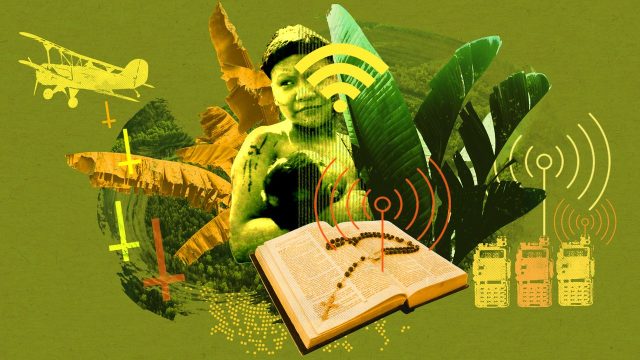
More uncontacted people live in Brazil’s Amazon rainforest than anywhere else in the world.
Consisting of about 100 isolated groups, they are aware of the outside world and some have limited trading relationships with neighbours – but most have chosen to live in voluntary isolation. And with good reason: contact has almost always been disastrous for them, from enslavement during the 19th-century rubber boom to more recent land grabs by illegal loggers and cattle ranchers.
But that isolation has been interrupted in unusual fashion, thanks to the efforts of US-backed Christian evangelical groups turning to technological innovations to circumvent the restrictions.
Hi-tech threat
Many missionary groups are active in the Amazon, said Survival International. “Some are comparatively benign or benevolent”, and there are many cases of missionaries being “targeted and murdered for standing alongside Indigenous peoples and campaigning for their rights”.
However, since 1987, Brazil has banned missionary groups from making contact with the rainforest’s isolated Indigenous groups, to protect their culture and their health. Uncontacted people do not have immunity to diseases common elsewhere, and “it is not unusual for 50% of any one group to be wiped out within a year of first contact by diseases such as measles and influenza”.
But a joint investigation by The Guardian and the Brazilian newspaper O Globo discovered that “solar-powered devices reciting biblical messages in Portuguese and Spanish” have appeared among members of the isolated and mostly uncontacted Korubo people in the Javari valley, near the Brazil-Peru border. The “yellow and grey mobile phone-sized unit”, seen by The Guardian, “recites the Bible and inspirational talks by an American Baptist”.
Government agents tasked with policing these regions say they have also spotted seaplanes and drones in the area. “Missionary activity now threatens 13 of the 29 isolated peoples that Brazil officially recognises as definitively confirmed,” said The Guardian, citing the federal prosecutor’s office.
‘Destructive power’
One of the leading missionary organisations operating in the Javari territory is the New Tribes Mission of Brazil, an offshoot of the New Tribes Mission in the US. Established in 1942, it referred to uncontacted Indigenous people as “brown gold”, also formerly the name of the organisation’s newsletter. Renamed Ethnos360 in 2017, it has an annual budget of about $80 million (£59.5 million).
During the Covid pandemic, it was reported that New Tribes Mission missionaries had been using seaplanes and a helicopter to fly over and map out uncontacted settlements in the Javari reserve.
In 2020, Brazil’s highest court prohibited missionaries from entering the reserve, which Indigenous representatives had warned could bring about a “genocide”.
The then president of Brazil, Jair Bolsonaro, a vocal vaccine sceptic, publicly sided with Christian evangelists. Earlier that year, he had appointed Ricardo Lopes Dias, a former evangelical missionary, to head the government’s department for isolated and recently contacted tribes.
Although the order remains in effect, Nelly Marubo, head of the Javari valley regional coordination office, told The Guardian that missionaries “frequently” visit the group’s base in Javari, “arriving directly by aircraft without passing government control posts”.
Indigenous organisations and activists say it’s crucial to reaffirm the non-contact policy. Technological outreach like audio Bibles might seem inoffensive curiosities, but Marubo said that the infiltration of outside religious and cultural beliefs has a “destructive power” for Indigenous groups. Exposure to “colonising” language and concepts “ends up cutting through the essence of the culture”.
Wealthy US-backed evangelical groups are sending drones to reach remote and uncontacted tribes, despite legal prohibitions




